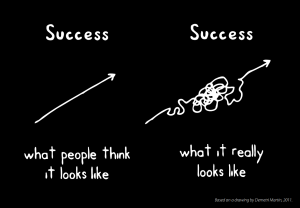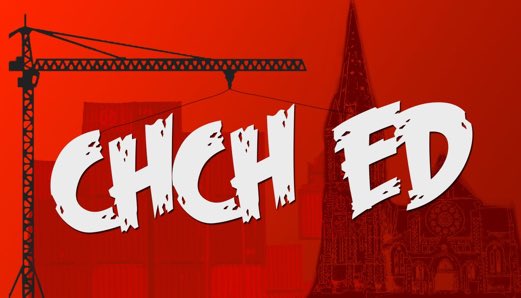Impatience.
It was a damp Sunday last weekend and with no Premier league on this weekend it was a perfect time to catch up on some of the articles that have come into my Twitter account recently.
The first one was an article titled, “Re- Imagine Space For Learning” by Alastair Blyth. As I am the principal of a new secondary school this was a topic that was of particular interest to me. The debate about the functionality of flexible learning spaces in schools continues to rage in New Zealand, to the point where we often seem to be focused on the buildings and not what is happening within them.
There was nothing in the article that I could disagree with, far from it, I was in total agreement with all that Blyth said. Statements like the following made perfect sense to me.
“Accommodation no longer consists of uniform classrooms, each equipped with thirty desks, a teacher’s dais and blackboard. Standard classrooms give way to a variety of spaces… Space for work in small groups, for discussions, for seminars, space for independent study and investigation.”
The comments around the importance of using all spaces in a multi-functional way also resonated. The need to see the canteen and corridors as legitimate learning environments is something that I personally feel very strongly about. Learning can and must take place anywhere and everywhere.
As I am working in a purpose built physical environment that offers a wide range of learning spaces to accommodate a wide range of learning environments and expediences, this was an article that I could easily relate to.
The next article I read was Dr Lucy Hone’s column published in the Sunday Star Times magazine. I have been fortunate enough to hear Dr Hone speak recently and was profoundly moved by her words, especially those comments relating to the responsibility we all have to ensure and maintain the well being of our children, so I read anything she writes with interest.
This weeks article was on the concept of Grit, a concept that is currently a hot topic in education circles. The article talks about grit as being defined as passion, purpose and perseverance. It talks about emphasising the importance of showing up on time, working diligently, sticking with the task even when it gets tough, being respectful and handling honest and sometimes critical feedback. All of these are ways that an individual develops the grit necessary to have the strength to face challenges.
No argument there. Much of what we did at Rolleston College in our first few weeks was designed specifically to ensure that our learners were in a safe and supportive environment where they could be encouraged to develop their perseverance or grit.
Back to Twitter then and an article written by Shelley Wright.
Again all of what she said struck a chord, especially when she talked about how important it is that young people discover what they are passionate about while they are at school. That they should discover that they can make a difference now. That they should leave school knowing what the are good at not just whether they are good at school [or not].
She went on to claim that that as they grow young people lose their natural sense of curiosity and how they need to;
- learn how to learn, fail and learn some more.
- constantly ask and be asked three questions. What are you going to learn? How are you going to learn? How are you going to show what you’re learning?
Nothing here that could not be taken directly from our school vision and values statements.
So far so good, The next article was a report of comments made by Mark Cuban, billionaire software developer and owner of the Dallas Mavericks.
The essence of what he was saying was that as computers become increasingly sophisticated an increasing number of what we see as occupations will disappear. To the extent, he argues that the key skill that will be in demand in the world of work in the near future is that of creative thinking. This is where he says that some of the ‘creative thinking’ areas such as the learning of languages or studying philosophy will become increasingly relevant for the type of thinking and creativity mind sets that they develop.
Cuban argues that we need to be aware that, “community building and creative thinking to create social impact,” are going to be increasingly important in the workplace.
Again no argument from me, I have long advocated the need to develop and foster creative thinking in schools.
Moving on then to Christiaan Henny and an article claiming that traditional academic content focussed learning is an inefficient and ineffective way of enhancing learning. Henny identifies the following nine factors that will shape education in the near future.
9 Things That Will Shape The Future of Education.
- Diverse time and place
- Personalised learning
- Free choice
- Project based
- Field experience
- Data Interpretation
- Exams will change completely
- Student ownership
- Mentoring
Yet again this article is synonymous with the way we are delivering learning through our three learning vehicles at Rolleston College.
All of this should have filled me with an inner warmth on an increasingly grey morning. Surprisingly it didn’t, in fact it left me feeling quite annoyed.
So why did a series of articles and reports that only supported the educational direction of Rolleston College cause such annoyance?
I guess the main reason is best shown by the flowing diagram;

The theories all make perfect sense, they are rational, logical and similar to the straight line on the left of this diagram. The reality on the floor is a little messier though. It involves people, limited hours, administration and bureaucracies. In short real life is a tangled line.
I am by nature an impatient person, in the words of Freddy Mercury, “I want it all and I want it now.”
So the tangled line, that is the real path to success means that after eight weeks everything is not perfect and not every question has been answered. Having the patience to work through this tangle is ultimately what was annoying me.
This though is our reality, smooth seas never made a great sailor and nothing worthwhile is easy so every time I feel impatient, frustrated or annoyed I have learnt to sit down, calm down and reflect.
Time then to reflect on what I had seen in the last week or so as I had visited learners, escorted visitors and generally wandered around the various learning spaces. What had I seen?
On Friday I was sitting in one of our meeting rooms in a cluster meeting with local primary school principals. From my seat I could look down one of our circulation corridor areas and watch with interest one of our teachers on her hands and knees in the corridor with a group of learners also working measuring , cutting, assembling, and racing backwards and forwards totally engrossed in a learning activity that was obviously something to do with Maths. Every part of me wanted to race out there and see exactly what they were doing but I didn’t, I just smiled as I observed how learning can take place anywhere. So this is what Blyth means when he refers to the multi functionality of space.
Later in the day I sat with three learners in the coding class. it would have been easy to be impressed by the web page that one of these 13 year olds had developed, animations almost jumped out of the screen, it looked professional and aesthetically well designed. What was more impressive though was listening to how she guided her peers through their web design whilst continuing to work on her own project. Here was a fully functioning team, each working on their own projects but where one ‘expert’ could assist and guide.
A first hand example of academic mentoring.
Minutes later I heard a conversation between a teacher and a learner about his project, designing and building a skateboard ramp. The conversation was about where he was going to access the materials to construct the ramp. The teacher was not providing the materials, the teacher was not even saying where they could be obtained from, the learner had already figured that out and was about to make some phone calls to arrange sponsorship to assist with the purchasing of these materials. The teacher was saying that they wanted to see the script that the learner had prepared to guide them through these phone calls. In other words the teacher was not making it easy for the leaner but they were ensuring that the learner was being guided through the tricky phone calls and ensure that they were well prepared for the phone calls before they made them. So I was observing project based learning and genuine learner ownership and accountability with the teacher supporting.
Our learners are busy working towards completing their first individual Quest project where they follow a passion with the aim of producing an event or artifact. As a result quite a few of my observations at this time related to these Quest projects. The day beforehand a group of three learners ran their cake stall that was the first part of their Quest work for this term. I could talk about the learning that went with this fairly straightforward project [budgeting, advertising, cooperation, social awareness in choosing the charity that they were going to support etc. but what really struck home was when I came across some further work that one of these learners had just completed. Working on her ‘nature verse nurture’ assignment she had decided not to just write an essay but instead use an app that enabled her to develop a visual presentation on an iPad and by holding your phone over the visual you activated her prerecorded narrative. I came across this when it was being used by a teacher to engage two boys who were struggling with the task as a way that they might be able to present their work. This particular learner is quite a shy and reserved learner yet in two situations I had seen her lead, innovate, create and provide material that was helping in the learning of others, I had seen her feel confident enough to make herself totally accountable for her own learning and feel the genuine sense of accomplishment that comes from operating just outside of what is comfortable. Her confidence was being transferred and as a result her engagement was soaring.
The list of precious moments continued. I watched a group of our learners practice the school haka that some of them had written and remembered the conversation that I had had with a learner about the personal karakia [prayer] that she had written as part of their learning and another conversation with another learner about the research she was doing into her iwi [tribe] and the stunning artwork design she had completed that represented her iwi.
All of these learners felt safe enough to explore their Maori identity and were excited about what they were discovering about themselves in the process. The fact that the Te Reo teacher who had created this supportive environment and had encouraged them is but eight weeks into his teaching career is in itself an amazing accomplishment.
As I reflected further I thought of how a group of our Mandarin learners presented their language skills to a full school assembly and how our French learners had suggested the French language song for out bell music of the week so that other learners could experience hearing a language that they were rapidly growing to love. Examples of learners who are demanding to showcase their learning and be accountable for what they are achieving and wanting to share this with their peers.
Sure these are small examples but when they are added together they start to paint a picture, that our tangled web is heading in the right direction and on the way sparks of creative thinking are stating to ignite. So the group of learners working with a local supermarket to trial boomerang reusable shopping bags are not only showing their entrepreneurial skills but also a sense of social awareness and responsibility, they are taking their learning beyond the school and out into the community.
Yes maybe I am wearing rose coloured spectacles but it is hard not to get excited when I watched a learner in our recently completed three way partnership conversations hold her parents and her Ako coach captivated as she led them through her E -Portfolio that showcased her learning. Here was a 13 year old speaking with confidence and considerable animation and holding adults in the palm of her hand. A further example of learner accountability and ownership.
I stopped reflecting at this point, I was comforted that as we journey down our tangled path I could easily see specific and real examples of all the features that the readings I had just completed had identified as being important and vital. We were doing it, even more important our learners were doing it.
Visually it looks a bit like the picture below.
We often refer to our whakatauki,
He kākano i ruia mai i Rāngiatea.
The seed will not be lost.
Well it feels like the seed is bursting through the surface. It is still a young seed but all of the examples above are our little seeds and they are growing, slowly but surely.

And then as Sunday afternoon loomed I wasn’t annoyed anymore, still impatient, still wanting to clear the tangles into a straight line, still wanting to speed up the growth of the seeds but that is the reality of a life in education.

Nice Post keep updating like this,
ReplyDeleteIPL Players 2017